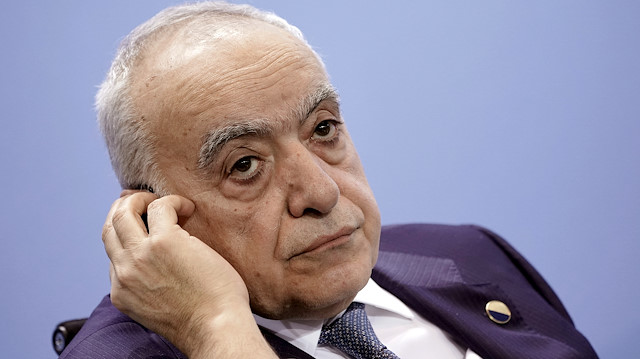
Joint commission to meet next week in Geneva
The 5 5 Military Commission will convene next week in Geneva to discuss the ceasefire between Libya's warring parties, a UN official said Tuesday.
Speaking to Anadolu Agency, Ghassan Salame, the UN special representative for Libya, said he is grateful for the participation and contribution of Turkish President Recep Tayyip Erdoğan in the international conference on Libya in Berlin, Germany on Sunday.
"I'm [also] extremely grateful for the participation of the Turkish delegation in the sixth preparatory meetings we had for Berlin led by [Turkish presidential spokesperson] Ibrahim Kalin, with whom I had a number of bilateral and positive meetings," he said, praising Turkey's efforts for peace in Libya.
Regarding recent violations of the ceasefire, Salame said the UN has been following the breaches since the truce was called for by Erdogan and Russian President Vladimir Putin.
The UN envoy pointed out that all parties at the Berlin conference had asked Libya's Prime Minister Fayez al-Sarraj and renegade commander Khalifa Haftar, who were in Berlin but not at the conference, "to extend the truce in order for us to give a chance for diplomacy."
Regarding the proposed 5 5 Military Commission to ensure the ceasefire, Salame said: "I have the five names from Mr. Sarraj and the five names from Mr. Haftar to have this joint commission meet as soon as possible so that the truce that has been called for by the two presidents [Erdogan and Putin] by the end of January becomes a full-fledged ceasefire."
At the Berlin conference, they agreed to a three-point plan – including the economic and financial, military and political track, he said.
Referring to al-Sarraj’s statement that he will not sit at the negotiation table with Haftar anymore, he said the war continuing for nine months is a sign of the “polarization.”
“The country is now politically very polarized,” he said, hoping that Libyans can become united.
On the recent closure of Libya’s oil ports, he said he called for the immediate reopening of all oil terminals.
“We do believe that oil is independent and not politically polarized,” he said, adding the country relies on oil exports for most its national revenue.
Therefore, the country cannot make the people hostages to political maneuvers, he added.
On Sunday, German Chancellor Angela Merkel and UN Secretary-General Antonio Guterres co-hosted the Berlin conference, which sought a stronger commitment from the world powers and regional actors to non-interference in Libya, genuine support for the ceasefire and adherence to the UN’s arms embargo.
On Jan. 12, the conflicting parties announced a ceasefire in response to a joint call by the Turkish and Russian leaders. However, talks for a permanent ceasefire ended without an agreement after Haftar left Moscow without signing the deal.
On Sunday, Haftar accepted in Berlin to designate members to a UN-proposed military commission with five members from each side to monitor implementation of the ceasefire.
Since the ouster of late leader Muammar Gaddafi in 2011, two seats of power have emerged in Libya: one in eastern Libya supported mainly by Egypt and the United Arab Emirates and another in Tripoli, which enjoys UN and international recognition.


